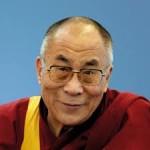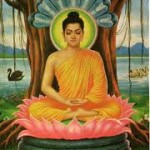So I’m having this relatively uneventful week, doing a bit of homework for my Dutch lessons, preparing for a class I’ll be teaching next term, defrosting the freezer, debating with a publisher as to why she should accept my next book, driving the kids to soccer and always arriving late, though no one seems to care, and wondering during my few un-busy moments what I’m actually doing with my life. Do I seriously think there’s more I can contribute to the addiction literature – besides blogging, which I love? Or should I hang up my spurs and take up growing tulips?
When all of a sudden I spy an email from the Mind and Life Institute, a group started by the Dalai Lama and a few other notables, whose mission is to identify links between the contemplative arts (e.g., Buddhist meditation) and neuroscience. I figured it was a generic invitation to their yearly conference. I went a few years ago, and it was actually great. Each day I woke up early, did a lot of yoga, ate a lot of vegetables, and spent many hours with my eyes closed, making infinitesimal progress toward enlightenment but getting pretty relaxed.
 No, it wasn’t that. It was a letter, addressed to me. I had to read it twice to believe it. It was an invitation to spend five days with the Dalai Lama at his residence in Dharamsala, all expenses paid. I would be one of fewer than ten scientists or scholars or addiction specialists, and we would be meeting with him throughout the five days to discuss craving and addiction. The Dalai Lama remains deeply interested in societal problems, especially those that might be addressed from both Buddhist and scientific perspectives. According to the letter, he sees addiction as a major source of suffering in today’s world. I have to agree with him there.
No, it wasn’t that. It was a letter, addressed to me. I had to read it twice to believe it. It was an invitation to spend five days with the Dalai Lama at his residence in Dharamsala, all expenses paid. I would be one of fewer than ten scientists or scholars or addiction specialists, and we would be meeting with him throughout the five days to discuss craving and addiction. The Dalai Lama remains deeply interested in societal problems, especially those that might be addressed from both Buddhist and scientific perspectives. According to the letter, he sees addiction as a major source of suffering in today’s world. I have to agree with him there.
So…yeah…I’m blinking rapidly and checking the address to make sure it’s not a hoax. They “very much hope you are able to join us for this special conference …” and would I please let them know as soon as possible. So I thought about it – for approximately 2 ½ seconds. I would give my left arm, maybe my right arm, to meet this man and talk about addiction with him and a few other folks. I’d go just for the ride. Just to be in his presence. Besides, Dharamsala isn’t Rotterdam. It’s halfway up the Himalayas. It’s a beautiful place according to the pictures. Just to be there would be an amazing trip, but to talk with this precious man about, let’s face it, my favourite subject. Yes, I accept!!!
I don’t know why I’m telling you all this. I guess just to share the most exciting moment in my life for the last couple of years. But this opportunity also brings to mind something I’ve thought about for awhile. When I argue my usual position, that addiction is not a disease, I often get a lot of flack. In particular, the disease advocates often argue that addiction must be a disease because it changes the brain, often irrevocably. And I argue back that I think addiction is an extreme form of normality, because normal learning also changes the brain, often irrevocably, especially when the learning concerns goals or intentions that are highly emotionally charged, such as falling in love, having a child, religious conversion, and, well, developing a serious fondness for coke, smack or booze. I haven’t yet been able to make my argument as articulate and convincing as I’d like to. In a recent post on a science blog, I tried to put it as succinctly as possible. And dozens of comments came back – most of which were not in agreement. So I’d counter that, if drug addiction was a disease, then so would gambling and other serious behavioural addictions be diseases, not to mention a passionate affair with the man or woman next door, and so on and so forth.
But how’s this for cutting to the chase: Just about everyone describes addiction as a continuous state of craving that can only be relieved by acquiring/doing the thing you crave. Whatever is going on in the brain, the psychology of it is  pretty straightforward. So if I were a Buddhist, I’d probably say: hey, that’s human existence for you. Human existence is characterized by longing, by craving…and then being propelled by the craving into grasping – which means going after the thing you crave and getting it. Which always lets you down, since material things never satisfy the emptiness that’s at the core of craving. Which is why Buddhists recommend that you do some serious meditating and thereby give up your attachments. When that starts to happen, then you can watch yourself being in a state of craving without going to the next step, grasping. You can just watch it, see it for what it is, and let it go.
pretty straightforward. So if I were a Buddhist, I’d probably say: hey, that’s human existence for you. Human existence is characterized by longing, by craving…and then being propelled by the craving into grasping – which means going after the thing you crave and getting it. Which always lets you down, since material things never satisfy the emptiness that’s at the core of craving. Which is why Buddhists recommend that you do some serious meditating and thereby give up your attachments. When that starts to happen, then you can watch yourself being in a state of craving without going to the next step, grasping. You can just watch it, see it for what it is, and let it go.
(Which may be why a lot of people find meditation extremely helpful for recovery.)
I wonder if the Dalai Lama will see addiction in a similar way. I suspect that he, of all people, will see it as an extreme form of attachment, which of course generates craving, which is why addicts suffer so much – until we’re able to watch the cravings come and go. I doubt I’d have to convince him than addiction is not a disease; it’s a highly focused state of longing – for something that glitters but isn’t even close to gold.
(Another reminder: Check out the Guest Memoir page, linked above. We’ve gotten a couple of new ones, and they’re really gripping. Please comment if you’ve got anything at all to add, or send us your own memoir.)

Leave a Reply